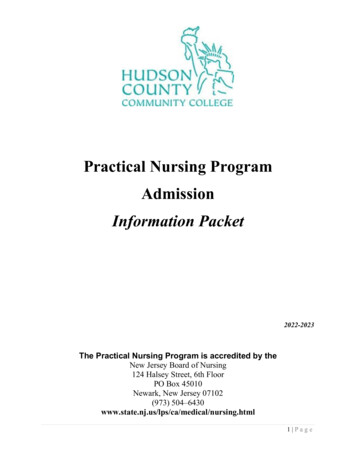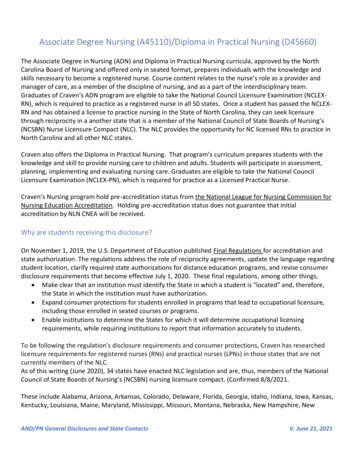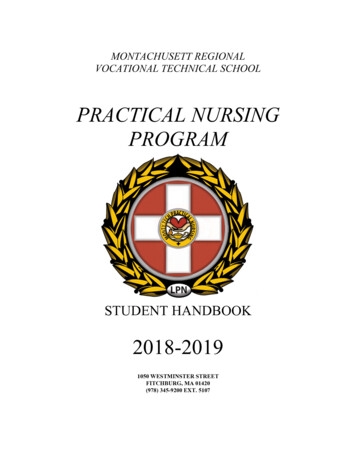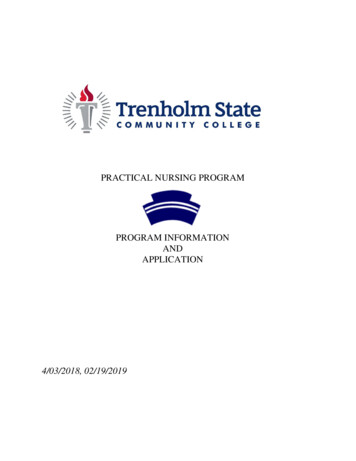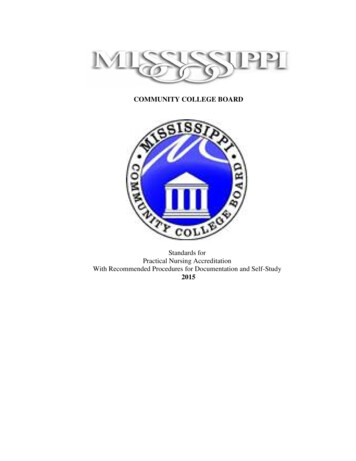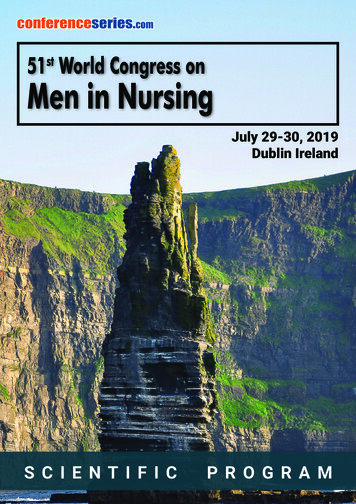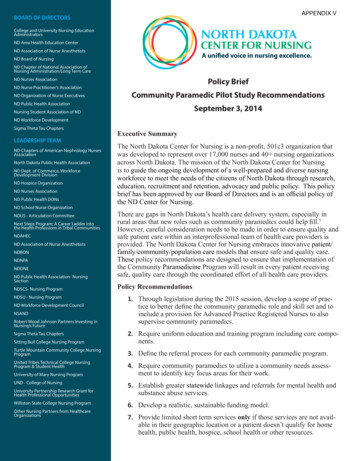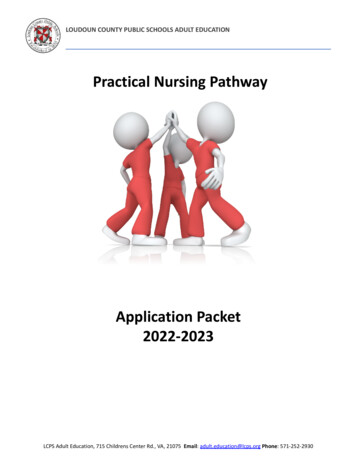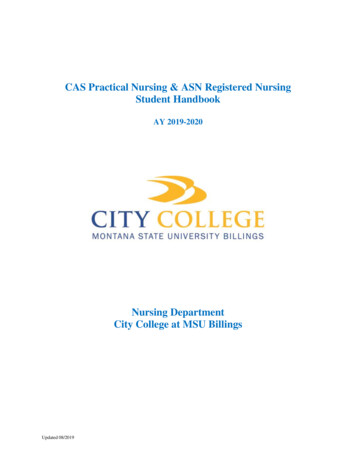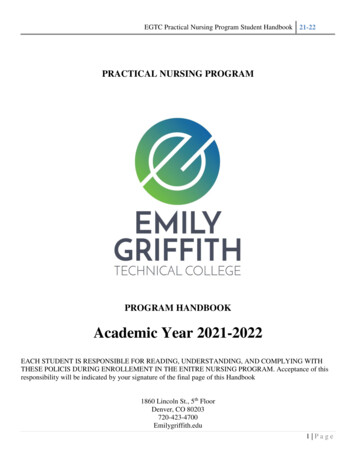
Transcription
EGTC Practical Nursing Program Student Handbook 21-22PRACTICAL NURSING PROGRAMPROGRAM HANDBOOKAcademic Year 2021-2022EACH STUDENT IS RESPONSIBLE FOR READING, UNDERSTANDING, AND COMPLYING WITHTHESE POLICIS DURING ENROLLEMENT IN THE ENITRE NURSING PROGRAM. Acceptance of thisresponsibility will be indicated by your signature of the final page of this Handbook1860 Lincoln St., 5th FloorDenver, CO 80203720-423-4700Emilygriffith.edu1 Page
EGTC Practical Nursing Program Student Handbook 21-22DISCLAIMER STATEMENTThe content of this handbook is provided for the information of the student. It is accurate at the time of printingbut is subject to change from time to time as deemed appropriate by the Nursing Program in order to fulfill itsrole and mission or to accommodate circumstances beyond its control. The Nursing Program reserves the rightto make changes in policy, regulations, and fees, as circumstances dictate, subsequent to publication. TheNursing Program expects its students to have knowledge of information presented in this handbook and in anyother college publications. Any such changes may be implemented without prior notice and without obligation,and, unless specified otherwise, are effective when made.The Nursing Program reserves the right to terminate programs or modify program requirements, content,schedule, delivery methods, and the sequence of the program offerings from semester to semester foreducational, financial or other reasons beyond the control of the college or Nursing Program.Policies and procedures specific to the Nursing Program are outlined in the Program Handbook. Students arealso responsible for knowing information contained in their syllabi regarding course specific policies andprocedures. Changes and updated communication are provided to students via the learning management system,Moodle and/or through their EGTC e-mail.EGTC Practical Nursing program licensure examination pass rates, completion rates and employment rates areavailable upon request in the nursing office and at https://www.emilygriffith.edu/practical-nursingAll resources utilized by the program (i.e. text, software, etc.) are considered archival if they are older than five(5) years.2 Page
EGTC Practical Nursing Program Student Handbook 21-22COVER . . . .1DISCLAIMER STATEMENT . . . . .2TABLE OF CONTENTS .3PROGRAM OVERVIEW . . .61.1 Description .61.2 Vision, Mission, and Values . .61.3 Program Faculty and Staff . .71.4 Program Learning Outcomes . . 81.5 Curriculum Plans . .9GENERAL ACADEMIC POLICIES . . .102.1 Academic Misconduct/Academic Dishonesty . . .102.2 Channels of Communication . . .102.3 Non-Discrimination Policy . . .102.4 Students with Disabilities . . 102.5 Suggestions and Complaints . 112.6 Grievances . . 112.7 Family Education Rights and Privacy Act (FERPA) . . . 122.8 Schedule Modification . . .152.9 Student Services . .152.10 Injuries .152.11Purchasing Textbooks and Supplies . . . . .162.12 Inclement Weather . .16NURSING PROGRAM POLICIES AND PROCEDURES . . .173.1 Standards of Nursing Care . . .173.2 Code for Licensed Practical Nurses/Vocational Nurses . . .173.3 Professional Conduct .183.3.1 Professional Behavior Expectations . . .193.3.2 Additional PN Expectations . .193.4 Social Media . 203.5 Admission to the Nursing Programs . . 213.6 Transfer/Advance Placement . . . 213.7 Progression/Retention . . . 223.7.1 Course failure . . .223.7.2 Grading . . . . 223.8 Withdrawal . . .233.9 Course Expectations and Policies . . .233.10 Behaviors which may result in placement on probationary status, disenrollment, or dismissal .233.11 Consequences for Non-Compliance for Standards of Conduct . . . .243.12 Probation and Program Dismissal . .243.13Substance Abuse. . . . .243.14 Attendance Expectations and Policies . . .253.15 Program Readmission . . .263.16 Testing Protocol . . . .273.17 Standardized Assessments . . .283.18 NCLEX Preparation Review . . .283 Page
EGTC Practical Nursing Program Student Handbook 21-223.19 Student Improvement Plan . . .283.20 Library Resources . .29CLINICAL POLICIES AND PROCEDURE . .294.1 Clinical Site Assignments . . .294.2 Clinical and Simulation Lab Attendance/Participation. . . .304.2.1 Attendance/Absences . . .304.2.2 Missed Clinical and Lab Hours. . . .304.2.3 Make up Fee . . .304.2.4 Inclement Weather .314.2.5 Preparation .314.3 Uniforms/Personal Appearance . . . .314.3.1 Dress Code for all Classes . . .314.3.2 Skills Lab and Clinical Practice Attire . . . .324.3.3 Badges . . . . .324.3.4 Required Supplies . .324.4 Student Clinical Progress (Evaluation) . . 334.4.1 Evaluation . . . 334.5 Preclinical Competency Exams. . . . 334.5.1 Skills . . 344.6 Smoking . . .344.7 Medication Administration . . . 354.8 Clinical Incidents 354.8.1 Student Error 354.8.2 Needle Stick Injury .354.9 Nursing Labs . . .364.10 Unsafe Clinical Practice Determination. . . . 364.11 Working Prior to Clinical .374.12 Blood Borne Pathogens 374.13 Clinical Clearance Documentation Requirements . . . .384.13.1 TB Test Report . . . . .394.13.2 Measles/Mumps/Rubella (MMR) and Varicella . . .394.13.3 Tdap . .394.13.4 Hepatitis B . . .394.13.5 Influenza Vaccine . . .394.13.6 CPR . . . . . .404.13.7 Drug Screen . . . . .404.13.8 Background Screening .404.13.9 Professional Liability Insurance 404.14 Change of Health Status . . . .414.15 Communicable Disease . . . .414.16 Conflict of Interest . .42APPENDIX-A . . .43Statement of Philosophy . . 43APPENDIX B . . .46Eligibility Requirements .46APPENDIX C . . .484 Page
EGTC Practical Nursing Program Student Handbook 21-22Student Improvement Plan .48APPENDIX D . . . .49Clnical Incident Report 49APPENDIX E .51Acknowledgement and Receipt of Handbook .51Confidentiality Agreement .51APPENDIX F .52For Cause and Random Drug Screen Waiver .525 Page
EGTC Practical Nursing Program Student Handbook 21-22PROGRAM OVERVIEW1.1DESCRIPTIONLicensed practical nurses (LPNs) are prepared to give direct patient care under the supervision of aregistered nurse or a physician. Employment areas include nursing homes, extended care facilities,physicians’ offices, medical clinics, hospitals, and home health agencies. The PN program preparesstudents for the National Council Licensure Examination (NCLEX-PN Examination). Students thatsuccessfully complete the IV Therapy for LPNs course are eligible for IV certification by the ColoradoState Board of Nursing.There are two PN Program options at EGTC: Day Cohort and Evening Cohort. Both options consist of16 nursing courses (37.5 credit hours) that are designed to achieve the Student Learning Outcomes andProgram Outcomes of the EGTC PN Program:Nursing offers mobility, flexibility, and numerous opportunities throughout the United States. Thegraduate of either program option is provided with a sound basis for entry into practice at theappropriate level.ACCREDITATIONThe nursing program is approved by the Colorado Board of Nursing. The Practical Nursing program atDenver Public Schools/Emily Griffith Technical College at the Emily Griffith Technical College locatein Denver, Colorado is accredited by the: Accreditation Commission for Education in Nursing (ACEN)3390 Peachtree Road, NE, Suite 1400Atlanta, GA 30326Telephone: 404-975-5000The most recent accreditation decision made by the ACEN Board of Commissioners for thePractical Nursing program is Continuing Accreditation.LEGAL LIMITATIONS OF LICENSUREState laws regulate the practice of nursing. Questions concerning licensure in a specific stateshould be directed to the state’s Board of Nursing. The Colorado Board of Nursing address and phonenumber are as follows:Colorado Board of Nursing1560 Broadway, Suite 1350Denver, CO 80202Phone: 303-894-2430 Fax: 303-894-2821Email: dora nursingboard@state.co.us1.2 VISION, MISSION AND VALUESCollege Mission: Preparing our students for today’s workforce and tomorrow’s opportunities.College Vision: To be Colorado’s leader in student success, instructional excellence, industrypartnerships and community engagement.6 Page
EGTC Practical Nursing Program Student Handbook 21-22Our Commitment:Emily Griffith Technical College is committed to excellence and diversity. A quality educationalinstitution accepts individuals as they are and assists them in becoming the best that they can be.Embracing this commitment, the school addresses the rapid pace of technological change and strives tobe an innovative leader where change and creativity are celebrated. Emily Griffith strives to develop andmaintain the best educational opportunities in the best educational environment possible.Core Values: At Emily Griffith, we strive every day to live our core values and to share with All WhoWish to Learn:Innovation:We strive to be an industry and education leader, to maintain an industry focus and perspective, and topromote technology driven workforce development.Culture: We strive to be leaders in community collaboration, to promote transparency andinclusiveness, and to embrace diversity and integrity.Continuous ImprovementWe strive to utilize communication and teamwork, to always look for process improvement, to maintainprogram, department, and employee accountability, and foster a culture of professional development.PN Program Mission: To provide quality nursing education that prepares the learner to become amember of the profession that meets the needs of a diverse population in an ever-changing health careenvironment in both rural and/or urban settings.1.3 PROGRAM FACULTY AND STAFFDirector of Nursing Education Programs:Marie Quinn, RN, BSN, MSOffice: 506 D720-423-4746marie.quinn@emilygriffith.eduFull Time Faculty:Patrice Hadley, BSN, RNOffice: 517patrice@emilygriffith.eduPart Time Faculty:Ginger Buckley MSN, MBA, RNLeslie Cowles, MSN, RNJerilinda Harper, BSN, RNPeggy Korman, MA, BSN, RNSarah Weller, BSN, RNSarah Owen, BSN, RNSeifu Tulu, MS, RNKali Kouanchao, MSN, CPNP-PCRebecca Dethman, MSN, RNSonia Berumen, BSN, RNKristin Lyons, MSN, RNMarian Hawley, BSN, RN, CCMMartha Cross, MS, BSN, h.edu7 Page
EGTC Practical Nursing Program Student Handbook 21-22Specialist/Department Assistant:Patricia Gallagher, BAOffice: uDean of the College of Health Sciences and AdministrationGenene Duran, Ph.D., MHAOffice: 506 RAM LEARNING OUTCOMESStudent learning outcomes (SLOs) are designed to prepare PN students for nursing practice, as well as tofacilitate articulation between in-state nursing education programs as required by the Colorado Nurse PracticeAct.The EGTC PN Program SLOs are as follows:1. Provide safe, quality, patient-centered nursing care in a variety of healthcare settings considering basicresearch, evidence, and patient preferences as the basis for care.2. Engage in critical thinking and clinical judgment to make patient-centered care decisions.3. Participate in performance improvement/quality improvement activities to improve patient care.4. Collaborate with healthcare team members, the patient, and the patient's support persons to facilitateeffective patient care.5. Use information technology to support and communicate the planning and provision of patient care.6. Manage care in a variety of healthcare settings for diverse patient populations through the process ofplanning, organizing, and directing.7. Function within the scope of practice of the Practical Nurse incorporating professional, legal, and ethicalguidelines.8. Promote a culture of caring to provide support, compassion, and culturally competent, holistic care.1.5CURRICULUM PLANThere are two PN Program options at EGTC: Day Cohort and Evening Cohort. Both options consist of 16 nursingcourses (37.5 credit hours) that are designed to achieve the Student Learning Outcomes and Program Outcomesof the EGTC PN Program:NUR 102: Alterations in Adult Health INUR 103: Basic Health Assessment for the Practical NurseNUR 104: Alterations in Adult Health IINUR 105: Practical Nursing Arts and SkillsNUR 110: Pharmacology for Practical Nursing4 credits1 credit5 credits6 credits3 credits8 Page
EGTC Practical Nursing Program Student Handbook 21-22NUR 111: Advancement into Practical NursingNUR 113: Basic Concepts of Maternal-Newborn NursingNUR 114: Basic Concepts Pediatric NursingNUR 115: Basic Concepts of Mental Health NursingNUR 116: Basic Concepts of Geriatric NursingNUR 170: Clinical I: Application of Practical Nursing Arts and SkillsWhen Caring for Adult PatientsNUR 171: Clinical II: Application of Adult HealthNUR 172: Clinical III: Application of Basic Concepts of MaternalNewborn and Pediatric NursingNUR 173: Clinical IV: Advanced Applications in Adult HealthNUR 201: IV Therapy for LPNs1 credit2 credits2 credits1 credit1 credit3 credits2 credits1 creditsTotal:3 credits2.5 credits37.5 creditsProgram Prerequisites:HPR 178 or HPR 139: Medical Terminology2-3 creditsBIO 106: Anatomy and Physiology4 creditsTaken within 7 years at the time of portfolio submission (Anatomy and Physiology courses at or above BIO106 may be accepted from institutions approved for incoming transfer credits as defined in the EGTCcatalog)Current CNA within 3 years or MA Certificate with Official Transcripts.Day Cohort PN Program: The Day Cohort PN Program is an eleven-month (two-term) program. Classroom,skills laboratory (lab), and are scheduled weekly; clinical practice hours are dependent upon and vary accordingto facility. Classroom and skills lab practice hours are scheduled between the hours of 7:30 am – 5:00 pm.Clinical hours may vary according to facility and course objectives. The clinical day may be 8, 10 or a 12-hourshift depending on the preferences of the clinical facility. On occasion, it may be necessary to assign weekendclinical hours when placement on weekdays is not available. Students will be assigned clinical practiceexperiences in the following areas: adult medical/surgical, psychiatric, geriatric, obstetric/gynecological, andpediatric nursing.Evening Cohort PN Program: The Evening Cohort PN Program is an eighteen-month (3-term) program.Classroom and skills laboratory (lab) are scheduled weekly; clinical practice hours are dependent upon and varyaccording to facility. Classroom hours are scheduled between 5:00 pm – 9:00 pm. Clinical and laboratory hoursmay vary according to facility and course objectives; the clinical day may be 8, 10- or 12-hour shifts dependingon the preferences of the clinical facility. Students will be assigned clinical practice experiences in thefollowing areas: adult medical/surgical, psychiatric, geriatric, obstetric/gynecological, and pediatric nursing.Transferring from the Day Cohort to the Evening Cohort and Vice Versa is only considered underspecial circumstances as determined by the Director of Nursing Education Programs.9 Page
EGTC Practical Nursing Program Student Handbook 21-22GENERAL ACADEMIC POLICIES2.1ACADEMIC MISCONDUCT/ACADEMIC DISHONESTYAcademic and non-academic misconduct: The Student Code of Conduct defines academic misconduct, nonacademic misconduct and the consequences or penalties for each. The Student Code of Conduct is available inthe EGTC Course Catalog 2021- 2022 on the Emily Griffith Technical College website.2.2CHANNELS OF COMMUNICATION1.2.3.2.3Individual student problems must be discussed first with the instructor of the class in which thestudent is registered.If the problem concerns the clinical experience of the student, the clinical instructor(s) must beconsulted first.If further assistance is needed, the student and instructor(s) will meet with the Director ofNursing Education Programs.NON-DISCRIMINATION POLICYEGTC is committed to a policy of non-discrimination based on race, sex, national origin, disability, orother non-merit reasons, in admissions, educational program or activities and employment, as requiredby applicable laws and regulations. Please see the EGTC Student Handbook for additional information.2.4STUDENTS WITH DISABILITIESEGTC is committed to providing equal access for persons with disabilities in accordance with theAmericans with Disabilities Act of 1990 (ADAAA) Amendments Act of 2008 and Section 504 of theRehabilitation Act of 1973, in addition to Section 508. In support of its commitment to provide equalaccess to all students, EGTC offers accommodations and support through Disability Support Services(DSS). Through DSS, all students will have equal access to all programs, services, and activities offeredat EGTC including: Accommodations for disabilities Advising - Academic advising, registration assistance and support services Third Party Support - Communication with case managers in the Division of VocationalRehabilitation or insurance agencies.Accommodations for Disabilities The student is responsible for self-identifying, requesting theaccommodation, and for providing documentation of their disability. Accommodations due to adisability should be requested at least three weeks prior to the service or class. Some services mayrequire additional time to process, so we advise that students submit their requests as early as possible.The first step to obtain an Accommodation is to submit documentation and complete an AccommodationRequest Form. Documentation may be submitted electronically or in person. The student will becontacted to schedule a meeting to discuss their specific needs with Disability Services and theinstructor of their class / program.10 P a g e
EGTC Practical Nursing Program Student Handbook 21-22Students may make an appointment by calling 720-423-4702 or emailing dss@emilygriffith.edu. Thedocumentation submitted must be from an appropriate, qualified professional on letterhead. It shouldstate the diagnosis of the disability, supporting information on how the diagnosis was reached, how thedisability affects academic performance, and recommendations and rationale for accommodations. Thedocumentation should provide enough information for the college to determine reasonable andappropriate accommodations. Recent high school graduates may submit their most recent IndividualizedEducation Program (IEP) if it contains a clear statement of the student's disability, supporting testingresults, and the impact of the disability on academic performance. The application and documentationwill be reviewed. Accommodations will be approved provided they are reasonable and appropriate. Thestudent is responsible for notifying the Disability Services office if any accommodation is notsatisfactory or if their needs have changed. Students attending non-credit courses or programs (thisincludes Workforce Training, QuickStart, Customized Training or any other non-credit course orprogram), will need to contact their Division of Vocational Rehabilitation counselor foraccommodations.Once the student has contacted the EGTC DSS Support Office, DSS will work with the student to offerreasonable accommodations. Advising Disability Services will assist any student who is disabled withacademic advising, registration assistance, and support services throughout their educational program.Students can make an appointment by calling 720-423-4702. Third-Party Support If a third-party such asthe Division of Vocational Rehabilitation or an insurance agency will be assisting a student financially,Disability Services will be available as a liaison.2.5SUGGESTIONS AND COMPLAINTSSuggestion: A suggestion is defined as an informal, constructive recommendation made to the nursingprogram at times of evaluations (written or verbal) which will assist the program to improve uponinstruction curriculum, teaching, policies, etc. Students are encouraged to provide suggestions eitherverbally to the program faculty or director or in written form.Complaints: A complaint is defined as an expression of dissatisfaction about something or someoneand is the cause or subject of protest. It is a formal allegation against a party or institution usuallyexpressed in a written, signed statement.2.61.Formal – a formal complaint is defined as a written, signed, and dated, formalized grievancefollowing the EGTC policies and procedures outlined in the EGTC Student Handbook2.Informal – an informal complaint is defined as a complaint which can be resolved on aninformal basis through mediation, a letter to the professor, a telephone call, or some otherresolution amenable to the student and institution.GRIEVANCESStudent Grievance Procedure Definition:A “grievance” is filed when a student believes they have been dealt with arbitrarily, unfairly or in wayswhich violate established laws, rules, policies or procedures, or best practices by the College and in amanner that has caused actual harm to the student. An “aggrieved student” is a student asserting agrievance.11 P a g e
EGTC Practical Nursing Program Student Handbook 21-22Grievance Procedure Steps:1. Students will discuss concern with staff/faculty member.2. If the aggrieved student does not feel that their issue has been resolved, the student should make anappointment to meet with the Director of Nursing Programs (DNEP).3. In the event that the aggrieved student is not satisfied with the decision from the conversation with theDNEP, the aggrieved student may submit a Student Grievance Form along with supportingdocumentation to the Instructional Dean of the program. The Instructional Dean will meet with theaggrieved student within five school days after receiving the form to resolve the issue.4. If the decision of the Instructional Dean does not satisfy the aggrieved Student, the Student GrievanceForm will be forwarded to the Student Oversight Committee. The Student has the right to appear beforethe Student Oversight Committee. The Student Oversight Committee will make a recommendation andnotify the Student Conduct Officer of their decision within 5 school days. The Oversight Committeemeets every third Thursday of the month at 9:00 am. The Director of Student Services will contact theStudent to provide the Student with the opportunity to meet with the Committee in-person.5. Student Conduct Officer either accepts or denies the Committee’s recommendation. Student ConductOfficer will notify the student of the decision within five business days. If the student does not acceptthe decision of the Committee, the student will be provided the process to file with COE.6. Council on Occupational Education:7840 Roswell Road, Building 300, Suite 325Atlanta, GA 30350Phone: 770-396-3898Fax: 770-396-3790URL: www.council.orgCertain Circumstances may require that the Student Oversight Committee considers the grievancewithout going through each of the steps listed above. These situations will be considered on anindividual basis.2.7FAMILY EDUCATION RIGHTS AND PRIVACY ACT (FERPA)The Family Educational Rights and Privacy Act (FERPA) affords eligible students certain rights withrespect to their education records (An “eligible student” under FERPA is a student who is 18 years of ageor older or who attends a postsecondary institution).These rights include:1. The right to inspect and review their records within 45 days after the day Emily Griffith TechnicalCollege receives a request for access. A student should submit to the Welcome Desk, a written requestthat identifies the record(s) the student wishes to inspect. The Welcome Desk will decide for access andnotify the student of the time and place where the records may be inspected. If the records are notmaintained by Student Services, they shall advise the student of the correct official to whom the requestshould be addressed.2. The right to request the amendment of the student’s education records that the student believes isinaccurate, misleading, or otherwise in violation of the student’s privacy rights under FERPA.12 P a g e
EGTC Practical Nursing Program Student Handbook 21-22Requests to amend a record should be sent to the Student Records office and clearly identify the part ofthe record the student wants changed and specify why it should be changed. Emily Griffith will notify thestudent in writing of the decision and the student’s right to a hearing regarding the request for amendment.Additional information regarding the hearing procedures will be provided to the student when notified ofthe right to a hearing.3. The right to provide written consent before Emily Griffith discloses personally identifiable information(PII) from the student’s education records except to the extent that FERPA authorizes disclosure withoutconsent. FERPA does authorize disclosure without consent in certain situations.For example, disclosure without consent can be made to college officials with a legitimate educationalinterest in the record. A College official is a person employed by the College in an administrative,supervisory, academic or research or support staff position (including law enforcement unit personnel andhealth staff); a person or company with whom the College has contracted as its agent to provide a serviceinstead of using college employees or officials (such as an attorney, auditor, collection agent or processorfor the mailing of 1098-T statements); a person serving on the College Board; or a student serving on anofficial committee, such as a disciplinary or grievance committee, or assisting another school official inperforming his or her tasks.Emily Griffith Technical College has designated the National Student Clearinghouse as a College official.A College official has a legitimate educational interest if the official needs to review an education recordin order to fulfill his or her professional responsibilities for the College.Upon request, the College discloses education records, without a student's consent, to officials of anotherschool, in which a student seeks or intends to enroll, or after enrollment. The college may share educationalrecords with parents under the following circumstances: for a student who is dependent under I.R.S. taxcode; a student under 21 years old who has violated a law or the school's rules or policies governingalcohol or substance abuse; and when the information is needed to protect the health or safety of thestudent or other individuals in an emergency.FERPA Annual Notice Addendum to Reflect Possible Federal and State Data Collection and Use As ofJanuary 3, 2012, the U.S. Department of Education's FERPA regulations have expanded the circumstancesunder which education records and personally identifiable information (PII) contained in such recordsincluding Social Security Number, grades, or other private information- may be accessed without studentconsent.The U.S. Comptroller General, the U.S. Attorney General, the U.S. Secretary of Education, or state a
The nursing program is approved by the Colorado Board of Nursing. The Practical Nursing program at Denver Public Schools/Emily Griffith Technical College at the Emily Griffith Technical College locate in Denver, Colorado is accredited by the: Accreditation Commission for Education in Nursing (ACEN) 3390 Peachtree Road, NE, Suite 1400
